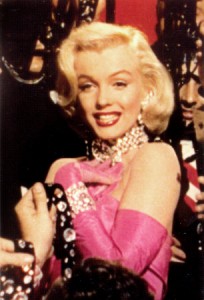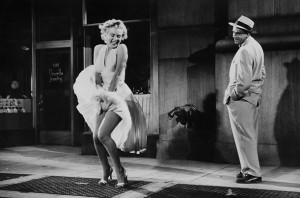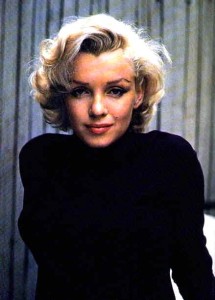We miss the performers who left us too soon almost as though we knew them.
In a new book, Phil Hall and Rory Leighton Aronsky ask What If They Lived? , with essays about stars and almost-stars from the silent era to the present, with biographical details, career assessments, and fascinating glimpses of projects they might have completed if they had lived longer. Hall was kind enough to answer my questions.
, with essays about stars and almost-stars from the silent era to the present, with biographical details, career assessments, and fascinating glimpses of projects they might have completed if they had lived longer. Hall was kind enough to answer my questions.
Q: How did this book come about?
Phil Hall: I always wondered what would have become of the great stars that died too young. If you see James Dean in “Giant” or Marilyn Monroe in “The Misfits,” it is difficult not to rue that there would be no further performances from its iconic stars – but if fate was kinder, could they have topped what they already created? The idea for the book percolated for years, but my attempts to get a publisher interested in the project were in vain. For whatever reason, many publishers did not think this was a good idea. Fortunately, BearManor Media, the publisher of my last book – The History of Independent Cinema – was convinced that this had potential. Rory Leighton Aronsky joined me as the co-author on the project, and here we are!
– was convinced that this had potential. Rory Leighton Aronsky joined me as the co-author on the project, and here we are!
Q: Do you have a favorite of the stars that you wrote about?
Phil Hall: The biggest surprise for me was Jayne Mansfield. Many people have dismissed her as a second-rate Marilyn Monroe imitator that audiences rejected. In fact, she was an extremely talented comic actress and her films were popular. Unfortunately, her studio, 20th Century Fox, found it more profitable to loan her out to cheapo production companies for crummy movies rather than build star vehicles around her. That wrecked her film career. But she could have worked steadily without being a movie star. In the mid-1960s, she sold out New York’s Copacabana at a time when nightclubs were considered passe. I also found a clip of Mansfield appearing as a “mystery guest” on the TV show “What’s My Line.” She received the most thunderous audience response imaginable when she came on stage – and this was two years before her death in a 1967 automobile accident.
Q: Some of the performers you wrote about died as big stars, but some died before they achieved all they were capable of. Which of the stars you wrote about do you think would have surprised audiences the most by showing more than anyone knew they were capable of?
Phil Hall: By the time of his death, Robert Walker was on the cusp of showing a depth of versatility that was not present in many of his films. Walker spent most of the 1940s playing a light leading man or a stolid military type. In his last two films, “Strangers on a Train” and “My Son John,” he showed that he was capable of handling dark, complex dramatic roles. This would have opened a new avenue of career possibilities, and he think that could have enjoyed a long and successful career.
Q: You write about stars like James Dean and Marilyn Monroe who continue to be modern-day icons and others like Judy Tyler and Evelyn Preer who are hardly remembered. Why do some stars remain so present in our culture and others do not?
Phil Hall: A lot of it depends on their output. Judy Tyler had a solid career in television and theater, but she only made two films – and only one, “Jailhouse Rock,” is remembered today. The bulk of Evelyn Preer’s cinematic output came in the all-black “race films” produced by Oscar Micheaux, but most of these films are considered lost. A great deal of public recognition also rests on the role of film critics and scholars in defining the popular cinema culture. For example, Larry Semon was a very popular star of comedy films in the 1920s, but very few contemporary critics or scholars are willing to champion in his cause. And, in some cases, we remember the stars because of off-screen tragedies rather than on-screen triumphs: Roscoe Arbuckle, Thelma Todd and Sharon Tate are the most prominent examples. But the beauty of cinema is the ability to preserve a performance forever, with the hope that future generations will come to re-evaluate a star’s personality and talent. I would say that there is a greater popular appreciation of Dorothy Dandridge and Jayne Mansfield today, due in large part to critics, scholars and fan revisiting their performances and recognizing their value to the film culture.
Q: Is there one uncompleted project you wrote about that you most wish could have been made?
Phil Hall: Laird Cregar was supposed to do a Broadway version of Shakespeare’s “Henry VIII,” but he died before the production could take shape. I cannot imagine a better actor to play the monarch, and he could have easily made it into a signature role that could have been taken to the film or television screen.
Q: Your profiles of each of the stars are insightful and evocative. How did you do your research?
Phil Hall: By reading too many books, magazines and websites, and by having conversations with experts who knew more about the subject than I could. For example, online film critic John J. Puccio is also an expert on classical music, and he provided invaluable opinions regarding Mario Lanza’s future potential, while rock music writer Ricky Flake helped me speculate on the future that Elvis Presley never had.
Q: Why do you think Judy Garland would have focused on concerts rather than movies if she had lived?
Phil Hall: I think there would be a combination of factors. First, there was a lack of quality roles for women of Garland’s age and personality. Second, Garland had a reputation for being (for lack of a better word) difficult, and many producers were not eager to take that risk. Third, there was the same problem that kept Montgomery Clift away from films: getting insurance for the star. Garland’s health problems were front-page news for years, and her presence in a film would have jacked up the budget in order to cover her insurance.
Q: Some of the people you wrote about had their careers limited by racism, sexism, or homophobia. Did that influence your ideas about what would have been possible for them if they had lived until more tolerant times?
Phil Hall: It did, because the contemporary concept of tolerance was a fairly recent development. We cannot create an alternative universe for the past where these talented people could have flourished without the restrictions that limited their careers. At the same time, we have to take into consideration another discriminatory concept: ageism. Hollywood is an industry that in constantly on the search for young new faces – good parts for people in their forties or older are difficult to come by, especially for women. What roles would exist for a 50-year-old Marilyn Monroe? It would be like that lyric from Stephen Sondheim’s “Follies”: “First you’re another sloe-eyed vamp. Then someone’s mother, then you’re camp.”
about his time as a third assistant director (basically a gofer) on the set of a movie she made in England with Sir Laurence Olivier. You can have your own week with Marilyn Monroe, the most popular sex symbol in movie history, by watching some of her films. I recommend:
 Gentlemen Prefer Blondes
Gentlemen Prefer Blondes Monroe plays a gold-digging showgirl in this colorful and energetic musical. Her signature song “Diamonds are a Girl’s Best Friend” inspired Madonna’s “Material Girl” video.
The American Film Institute’s pick for the funniest American movie of all time is Billy Wilder’s gender-bending masterpiece about two male musicians (Tony Curtis and Jack Lemmon) who disguise themselves as women and join an all-female band so they can hide from mobsters. Monroe plays the band’s lead singer who has a weakness for saxophone players. It gets better and funnier every time you see it.
Yves Montand plays one of the wealthiest and most successful men in the world. When he hears that a small off-Broadway musical satiric revue makes fun of him, he goes to the theater to complain. But the director thinks he has shown up to audition and when he sees Monroe (in sheer practice tights and leotard) is in the cast, he pretends to be an actor. She sings a sizzling version of “My Heart Belongs to Daddy.”
Many people think Monroe’s best performance as an actress is in this poignant story of a cowboy in love with a bar girl. She sings a heartbreakingly (intentionally) trashy “That Old Black Magic.”
Monroe’s most iconic pose comes from this film about an innocent flirtation between a man who stays in New York while his family is on vacation and his free-spirited upstairs neighbor.
When Monroe wanted to be taken more seriously as an actress she formed a production company to finance this film, co-starring and directed by Sir Laurence Olivier. It is more interesting to watch to compare their incompatible acting styles than it is to try to care about the slight story, but definitely worth seeing if you plan to watch “My Week With Marilyn.”
Monroe co-stars with Lauren Bacall and Betty Grable in this romantic comedy about three blonde models with a plan to find wealthy husbands.



